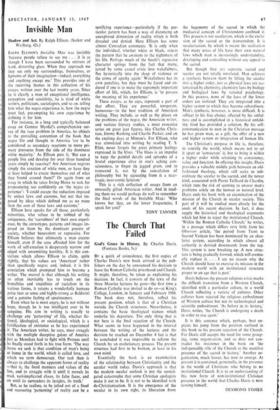Invisible Man
RALPH ELI,ISON'S Invisible Man was invisible 'because people refuse to see me . . . it is as though I have been surrounded by mirrors of hard, distorting glass. When they approach me they see only my surroundings, themselves, or figments of their imagination—indeed, everything and anything except me.' This provides one of the recurring themes in this collection of his essays, written over the last twenty years. Since .he is clearly a man of exceptional intelligence, perception and sensitivity, he is tired of white writers, politicians, sociologists, and so on, telling him what the negro experience is, how the negro must feel, pre-empting his own experience by defining it for him.
For instance, in a long and typically balanced essay on Gunnar Myrdal's comprehensive sur- vey of the race problem in America, he objects to the prevailing contention of the book that negro life and thought in America 'are to be considered as secondary reactions to more pri- mary pressures from the side of the dominant white majority.' As Ellison puts it, 'But can a people live and develop for over three hundred years simply by reacting? Are American negroes simply the creation of white men, or have they at least helped to create themselves out of what they found around them?' Or again from an essay in which he takes Irving Howe to task for pronouncing too confidently on 'the negro ex- perience': 'I could escape the reduction imposed by unjust laws and customs, but not that im- posed by ideas which defined me as no mope than the sum of those laws and customs.'
Ellison here speaks for all those, particularly minorities, who refuse to be robbed of the uniqueness, the 'sacredness' of their own experi- ence, by the stereotypes, patterns and images im- posed on them by the dominant powers of society, whether benevolent or repressive. For Ellison believes that ultimately a man creates himself, even if the area afforded him for the work of self-creation is desperately narrow and edged with unremitting hostility. It is this con- viction which allows Ellison to claim, quite rightly, that his values are 'American' rather than specifically negro; and, indeed, it is this conviction which prompted him to become a writer. The marvel is that although his writing so often inevitably has to touch on the brutalities and stupidities of racialism in its various forms, it retains a wonderfully humane poise (not so tense and highly-strung as Baldwin) and a genuine feeling of spaciousness.
Even when he is most angry, he is not without hope, though he is too intelligent ever to be sanguine. His aim in writing is usually to challenge any 'patterning' of life, whether fic- tional, ideological, or sociological, which is a falsification of existence as he has experienced it. The American writer, he says, must struggle with the multiple deceptive guises of America lust as Menelaus had to fight with Proteus until he finally stood forth in his true form. 'The way home we seek is that condition of man's being at home in the world, which is called love, and which we term democracy. Our task then is always to challenge the apparent forms of reality —that is, the fixed manners and values of the few, and to struggle with it until it reveals its mad, van-implicated chaos, its false faces, and on until its surrenders its insights, its truth.'
But, as he realises, to be jolted out of a fixed and reassuring 'patterning' of reality can be a
terrifying experience—particularly if the par- ticular pattern has been a way of distancing an unexplored dimension of reality which is both dreaded and denied. Here Ellison has some almost Conradian comments. `It is only when the individual, whether white or black, rejects the pattern that he awakens to the nightmare of his life. Perhaps much of the South's regressive character springs from the fact that many, jarred by some casual crisis into wakefulness, flee hysterically into the sleep of violence or the coma of apathy again.' Wakefulness has its own penalties, but they must be faced and en- dured if one is to make the supremely important effort of life, which, for Ellison, is `to possess the meaning of his experience.'
These essays, as he says, represent a part of that effort. They are powerful, temperate, humorous—in the best tradition of American writing. They include, as well as the pieces on the problems of the negro, the American writer, and various literary studies, a most evocative series on great jazz figures, like Charles Chris- tian, Jimmy Rushing and Charlie Parker, and on the exciting days at Minton's. For Ellison, who was stimulated into writing by reading T. S. Eliot, never forgets the great primary feelings expressed in the blues. 'The blues is an impulse to keep the painful details and episodes of a brutal experience alive in one's aching con- sciousness, to finger its jagged grain, and to transcend it, not by the consolation of philosophy but by squeezing from it a near- tragic, near-comic lyricism.'
This is a rich collection of essays from an unusually gifted American writer. And in read- ing them we would perhaps do well to remember the final words of the Invisible Man: 'Who knows but that, on the lower frequencies, I speak for you?'
TONY TANNER TONY TANNER






























 Previous page
Previous page